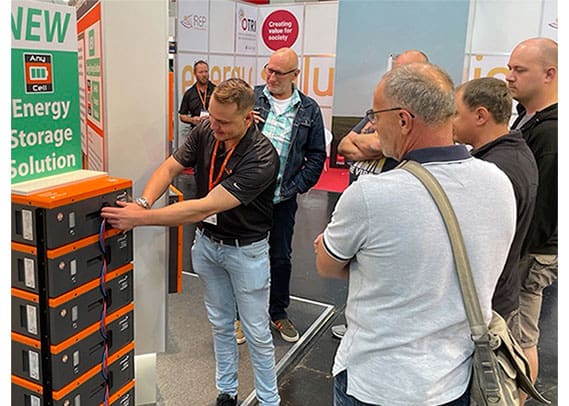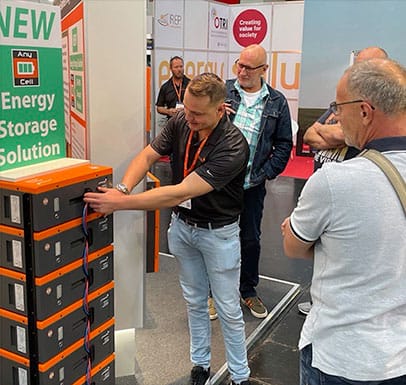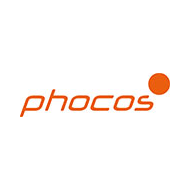
Serie de sistemas de almacenamiento de energía LFP
La serie de sistemas de almacenamiento de energía LFP Any-CellTM (ESS-L) de Phocos es una solución LiFePO4 compacta y modular que ofrece un sistema de almacenamiento seguro, respetuoso con el medio ambiente y de larga vida útil. Mejorado por un sistema de gestión de batería (BMS) avanzado integrado, el Any-Cell ESS-L proporciona una integración perfecta con otros productos Phocos. La tecnología de fosfato de hierro y litio (LiFePO4) es respetuosa con el medio ambiente en comparación con otras opciones de almacenamiento tradicionales, ya que ofrece una vida útil más larga, un funcionamiento sin mantenimiento y una eficiencia de carga y descarga mejorada en general. Cuando se combina con los inversores híbridos Any-Grid de Phocos, estas importantes ventajas hacen que la serie Any-Cell ESS-L sea clave para ofrecer a los clientes el costo total de propiedad más bajo durante la vida útil de su sistema.
La compatibilidad con la serie de cargadores inversores híbridos Any-GridTM de Phocos hace que el sistema de almacenamiento de energía Any-Cell sea la solución perfecta para una solución de energía modular completa que sirve a un amplio espectro de aplicaciones y requisitos de energía. Con la modularidad de Any-Cell, el diseño y la instalación del sistema se pueden personalizar para escalar y hacer crecer los sistemas fácilmente a medida que los requisitos de energía cambian con el tiempo. Cuando se combina con la puerta de enlace de monitoreo y control Any-BridgeTM AB-PLC de Phocos, el Any-Cell ESS-L se integra a la perfección con el portal de la nube PhocosLink Cloud, lo que permite el monitoreo y control remoto del sistema en tiempo real desde cualquier parte del mundo.
El Any-Cell hace que la instalación del almacenamiento de energía sea rápida y fácil con manijas integradas para admitir instalaciones de montaje en pared y en bastidor. Diseñado y probado para cumplir con los rigurosos estándares internacionales de seguridad y confiabilidad, el Any-Cell está respaldado por una garantía estándar de 10 años respaldada por un proveedor probado y líder en la industria en Phocos. La serie Any-Cell ESS-L representa lo último en innovación de Phocos y complementa una cartera existente de productos diseñados para proporcionar soluciones flexibles de acceso a la energía en cualquier lugar, en cualquier momento y en cualquier red (Any-Grid).
-
Características del producto
• Compatible con inversores seleccionados de terceros*
• Integración perfecta con la cartera Any-Grid de Phocos
• Química LiFePO4 / LFP segura y libre de mantenimiento
• Sistema de gestión de batería avanzado
• Factor de forma compacto y de alta eficiencia
• Modular, escalable hasta 8 baterías en paralelo
• Montaje en pared o bastidor
• Alta eficiencia y baja resistencia
• Alta tasa de carga/descarga
• Más de 6,000 ciclos al 90 % DoD
*Solo disponible en stock en Tucson, AZ y Bubesheim, Alemania. Póngase en contacto con nuestro equipo de ventas para obtener más información.
-
Ficha técnica y literatura del producto
-
Declaraciones y certificaciones
-
Compatibilidad con inversores
El Any-Cell ESS-L se integra perfectamente con el inversor híbrido Any-Grid PSW-H a través del Any-Bridge AB-PLC-CAN.
El Any-Cell ESS-L también es compatible con los siguientes inversores de terceros*:
- Solis
- Victron
- GoodWe
- SMA
- SUN
- Deye/SunSynk
- AISWEI
*Solo disponible en stock en Tucson, AZ y Bubesheim, Alemania. Póngase en contacto con nuestro equipo de ventas para obtener más información.
Vídeos
Preguntas frecuentes
- ¿Vale la pena invertir en baterías de fosfato de hierro y litio (LiFePO4)?
Sí, los sistemas de almacenamiento de energía que implementan la tecnología de celdas LiFePO4 pueden ofrecer a los usuarios un retorno de la inversión dentro del ciclo de vida de la batería. Si bien pueden tener un costo inicial más alto en comparación con otras tecnologías de baterías como el plomo ácido, vale la pena la inversión porque ofrecen una vida útil más larga y pueden descargarse a una profundidad mucho mayor. Por ejemplo, una batería de 5 kWh cargada mediante métodos renovables y descargada 6000 veces al 90 % del DOD proporcionará 27 MWh de energía almacenada.
- ¿Por qué las baterías de fosfato de hierro y litio (LiFePO4) son mejores que otras opciones de almacenamiento de energía en el mercado?
Las baterías de plomo ácido tradicionales requieren un mantenimiento regular y solo se pueden descargar hasta aproximadamente el 50 % de su capacidad y, por lo general, no duran tanto como las LiFePO4. Los sistemas de almacenamiento de energía LiFePO4 tienen sistemas de gestión de baterías integrados que protegen las celdas y no requieren ningún mantenimiento, y algunos pueden descargarse hasta el 90 % de su capacidad para una mayor utilización. Al elegir LiFePO4, se puede esperar alta eficiencia, alta densidad de energía, larga vida útil, alta profundidad de descarga, sin mantenimiento y una velocidad de carga rápida. En comparación con otras químicas del litio, LiFePO4 es más seguro: es mucho menos inflamable y alcanza una fuga térmica a una temperatura más alta que otras.
- ¿Cuál es la vida útil esperada de las soluciones de almacenamiento de energía de fosfato de hierro y litio (LiFePO4)?
Se puede esperar que la mayoría de las baterías LiFePO4 duren entre 5 y 10 años sin dejar de estar dentro de la garantía del fabricante. Las baterías LiFePO4 que se utilizan de forma conservadora y se mantienen en condiciones ideales podrían durar más de 10 años.
- ¿Por qué el almacenamiento de energía de fosfato de hierro y litio (LiFePO4) es una buena opción para aplicaciones solares?
Los sistemas de almacenamiento LiFePO4 son la química más segura para el almacenamiento de energía residencial y comercial y tienen un ciclo de vida alto, lo que significa que son ideales para sistemas fotovoltaicos basados en baterías que se espera que experimenten ciclos SOC diarios y un período ocasional de autonomía cuando no hay sol disponible.
- ¿Qué beneficios ofrece una solución de batería de fosfato de hierro y litio (LiFePO4) a un hogar o una pequeña empresa?
El almacenamiento de energía LiFePO4 puede ofrecer un retorno de la inversión a largo plazo al reducir o eliminar la dependencia del propietario de una vivienda o negocio del servicio público, o brindar tranquilidad al ofrecer un sistema de energía de respaldo en caso de apagones.
- ¿Qué es el almacenamiento de energía de fosfato de hierro y litio (LiFePO4)?
El fosfato de hierro y litio (LiFePO4) es uno de los muchos tipos de químicos de celdas de litio que se utilizan para construir sistemas de almacenamiento de energía (ESS). Las implementaciones de LiFePO4 para el almacenamiento de energía pueden variar desde una batería portátil en un teléfono celular o dispositivo portátil hasta una batería estacionaria utilizada para proporcionar energía a hogares, vehículos recreativos, empresas o microrredes.
- ¿Qué es el fosfato de litio y hierro (LiFePO4)?
LiFePO4 es la fórmula del compuesto químico del fosfato de hierro y litio, que es una química específica de las celdas de litio que se utiliza en sistemas de almacenamiento de energía.
- ¿Cuáles son las mejores pautas para la profundidad de descarga con almacenamiento de energía de litio?
Establecer un DOD inferior al límite máximo absoluto del fabricante significará una vida útil más larga para su batería. Si desea extender la vida útil de su batería mucho más allá de la garantía del fabricante, implemente más capacidad de almacenamiento de energía de la que necesita diariamente para que el requisito diario de DOD sea bajo.
- ¿Qué es DOD o profundidad de descarga?
DOD es el porcentaje de capacidad que permite que un sistemas de almacenamiento de energía se descargue en un ciclo desde un estado de carga completa (SOC). Por ejemplo, un DOD del 75 % significa que una batería puede descargarse hasta el 25 % de su capacidad total total. DOD = 100 – SOC al final de la carga.
- ¿Las baterías de fosfato de hierro y litio (LiFePO4) se degradarán con el tiempo?
Todas las baterías, sin importar el tipo de celda o la química, se degradarán con el tiempo. Las temperaturas o voltajes excesivamente altos o bajos y las tasas de carga o descarga excesivamente altas aumentarán la degradación de una batería (medida como estado de salud, la relación entre la capacidad original y la capacidad utilizable actual). Por el contrario, utilizar límites conservadores de voltaje y corriente, así como mantener una temperatura ambiente moderada, puede ayudar a prolongar la vida útil de cualquier celda de batería.
- ¿Qué significa LFP?
LFP significa Fosfato de Litio y Hierro, cuya fórmula química es LiFePO4. Una batería LiFePO4 es un tipo específico de batería de iones de litio sin cobalto que utiliza LiFePO4 como material del cátodo.









